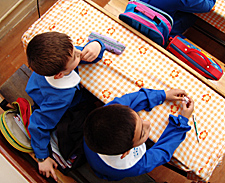 Recent changes to the Queensland Education Act have led to renewed discussion about the place of Special Religious Education (S.R.E.) in our schools. From July, parents north of our border will need to "opt in' for their children to receive Scripture Teaching from their nominated religion, rather than receiving lessons by default as is the current practice.
Recent changes to the Queensland Education Act have led to renewed discussion about the place of Special Religious Education (S.R.E.) in our schools. From July, parents north of our border will need to "opt in' for their children to receive Scripture Teaching from their nominated religion, rather than receiving lessons by default as is the current practice.
The local debate was fuelled in recent weeks with an opinion piece in Sydney Morning Herald in which Emily Maguire suggested similar changes be made to N.S.W. schools. The letters page on the following day continued the discussion.
One of the reasons such suggestions gain popularity is the fear of proselytizing, or in other words, conversion of people from one faith to another.
Which raises the question: is scripture teaching for proselytizing or pastoring? Is it for the purpose of mission or for nurture? Do we teach S.R.E. so that students will become Christians, or so that they will mature in their understanding of Christianity?
Some important clarification is found in the words of the official Department of Education and Training S.R.E. Information Sheet , required to be distributed to parents upon enrolment. It states that:
"Special religious education (SRE) is provided in public schools, during school time, by authorised representatives of approved religious groups for instruction in that faith. Special religious education is voluntary and schools organise it according to parent preference."
This official statement provides great clarity as to the task of the Scripture Teacher. Firstly, it gives us the confidence that if the school has correctly handled the enrolment and timetabling arrangements, then the students in our classroom are all children of Protestant parents or of parents who have enrolled them to be part of the SRE class. Through the official process of enrolment, the parents have indicated the religious background of their children, and have given approval for voluntary religious education for their child.
Secondly, the official D.E.T. statement makes it clear that our job is not to proselytize, but instead to instruct the students in their nominated faith. Knowing that all of the students in the classroom are enrolled as Protestant means that the job of the S.R.E. teacher is to just teach the faith.
So, what is the Protestant faith? Quite simply, it's summarised by the five "solas' of the Protestant Reformation"”sola gratia ("by grace alone"), sola fide ("by faith alone"), sola scriptura ("by Scripture alone"), Solus Christus ("Christ alone"), Soli Deo Gloria ("Glory to God alone").
Fortunately, this Protestant belief is found in the Scriptures, which form the basis for our Scripture Teaching, as articulated in the approved denominational material, such as the C.E.P. Connect curriculum. Furthermore, it is certainly appropriate for us to teach the class about the distinctives of Protestantism, as well as the history of the Reformation.
However, it is difficult to avoid the fact that the majority of our students are nominal Protestant Christians, that is, by name only. Many of the kids in the classroom wouldn't even call themselves Christians, let alone show any signs of commitment to Jesus as Lord.
So what should we do? Should this change our task? Certainly not. Our job is to teach these students what they are. Their parents say they are Protestant Christians, so we should teach them what that means. And, of course, this will involve teaching them what God says in the Bible, and how he calls all men and women to live in response to the gospel.
This makes preparation and delivery of Scripture lessons much easier. Rather than trying to work out if I'm trying to evangelise or edify, we simply teach the students how Protestant Christians should live and think. We won't call people to become Christians, we will simply declare from the Scriptures what Protestant Christians believe and how they should respond to Jesus, and to follow that other Reformation principle as articulated by Luther, we will let the word do the work!
The current S.R.E. system in N.S.W. is win-win. It allows children to be trained in the distinctives of their household faith, whilst still enjoying a broad education from the existing General Religious Education syllabus.
Any changes to the current system will weaken the overall education of our children in State schools, and will signal a win for secularists and atheists, and a loss for the majority of parents who desire rigorous religious education in their publicly-funded schools.
Jodie McNeill is a Youth Ministry Trainer and Year 13 Director at Youthworks College. Visit his website at [url=http://www.jodiemcneill.com]http://www.jodiemcneill.com[/url]























